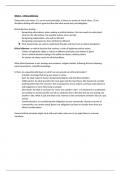Week 1 – Ethical dilemma
Today ethics can mean: 1) a set of moral principles, a theory or system of moral values. 2) the
discipline dealing with what is good and bad and what moral duty and obligation.
Ethical decision making
- Recognizing alternatives; when making an ethical decision, first one needs to understand
what are the alternatives, the possible actions once can take.
- Recognizing stakeholders; who will be affected.
- Recognizing consequences; how will they be affected.
Most importantly, we need to understand the gain and loss from an ethical standpoint.
Ethical dilemma: an ethical decision that involves a clash of legitimate ethical values.
- Clashes of legitimate rights or values or different principles and notions of good.
- Core to ethical decision-making is the ability to balance clashing values.
- No clashes of values means no ethical problem.
What ethical behavior is not: feelings and emotions, religious beliefs, following the law, following
social conventions, scientific knowledge.
Is there an unquestionable basis on which we can ground our ethical principles?
- Aristotle: do things that bring you closer to virtue.
- Kant: do what respects human fundamental dignity and self-determination.
- Utilitarianism: do what provides the most good and the least harm. We should not consider
anything other than the outcome, the consequences of our actions, and how much pleasure
and happiness or harm they bring to people.
- John Rawls: do what is necessary to “share one another’s fate”. It is important to understand
our position in society and the core of our existence lies in the idea that we are sharing one
another’s fate. What is just and what is fair. Fairness is the cornerstone of Rawls’ idea of a just
society.
- Communitarians: act considering the obligations to your community. Humans are part of
communities, we cannot simply ignore our obligations to them or exclude them from our
ethical considerations.
General ethical principles might clash with each other when we try to apply them to concrete
situations.
, Week 2 - Aristotle
Terms:
- Eudaimonia: happiness, flourishing, the highest good.
- Telos: purpose or goal.
- Logos: reason, speech, ratio.
- Arete: virtue, excellence in fulfilling one’s telos.
According to Aristotle, the purpose of politics is the good life.
What is the highest good? According to Aristoteles everyone wants eudaimonia, which means being
possessed by a good spirit, nowadays would be translated as happiness, but in a fulfilling sense,
flourishing, well-being or welfare. The highest good is:
- Something self-sufficient; by which Aristotle means that it is something that is enough for
good life.
- It is something desirable for itself (so not wealth to buy other things).
- It is not desirable for the sake of the highest good.
- The highest good is such that all other goods are desirable for the sake of the highest good.
This means that you cannot augment it, meaning you cannot make it better by adding more
goods. In that sense the highest good is final, it is the ultimate purpose, the goal of the good
life.
Telos; goal, end, and function is a notion that plays an important role in the thought of Aristotle.
So to understand what the meaning of eudaimonia is, we need to understand the telos of the good
life.
Aristotle’s key idea in defining the telos of humans is the following: understanding the telos of
humans means identifying what is particular to being human. Speech is the special property of man
in distinction from other animals. The word for speech is logos.
Logos; means reason structured thought, but also ratio and speech. Speech and reason are intimately
connected, one cannot exist without the other.
With speech man can declare what is just and what is unjust, and distinguish right from wrong and
the other moral qualities. This explains why man is a political animal by nature. Aristotle sees us as
beings ‘meant for political association’, the reason he gives is this: human beings, unlike other
animals, are furnished with the faculty of language.
Besides speech, an active life that contains an element of reason distinguishes man.
The telos of man: to live a life of activity following reason.
Arete; excellence or virtue (virtue = a state of character or disposition that allows an individual to act
in accordance with reason and moral excellence).
An eudaimonia life (the highest good): a life where we perform our telos with arete (excellence). It
is the life where we perform the activity of reason in the most excellent way.
Following Aristotle, there are two parts of the soul:
1) The rational: practical wisdom; the one that does mathematics, physics and philosophy.
2) The irrational:
a. Completely without reason; our human functions (instincts)





